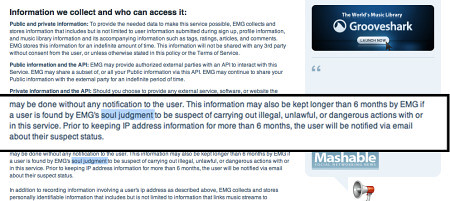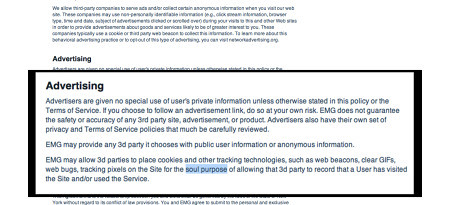Judge Rejects Key Universal Music Argument In Legal Fight With Grooveshark
from the overreach... dept
Two and a half years ago, Universal Music (UMG) sued Grooveshark (or, really, its parent company Escape Media). The case has had a few twists and turns since then, but the judge has issued a ruling (embedded below) that is pretty clear in suggesting that Universal Music's key argument -- the the DMCA does not apply to pre-1972 songs -- was a massive overreach, and the court will not accept it. Separately, the court flat-out rejected UMG's attempts to have Grooveshark's counterclaims of tortious interference dismissed. There's no way to look at this other than a pretty big win for Grooveshark and a big loss for Universal, though the case is far from over.On the key point, Grooveshark has long argued that what it does is really no different than what YouTube does, in that it allows individuals to upload content, and if it receives a takedown notice, it proactively follows the DMCA's takedown process and removes that content. Realizing that getting around the DMCA's safe harbors was a longshot, Universal Music instead reverted to a somewhat twisted argument, saying that pre-1972 sound recordings are not covered by the DMCA, and thus there are no safe harbor protections. To understand why they'd make this argument, you can read up on the history of pre-1972 copyrights for sound recordings -- a huge mess that the US Copyright Office is still trying to figure out how to fix. But, the short version is that, currently, sound recordings from before 1972 are not technically under US federal copyright law, but various (and often crazy) state laws. Since the DMCA refers to works under federal copyright law, Universal Music's arguments is that the DMCA doesn't apply, thus the safe harbors don't apply, and Grooveshark can't rely on its safe harbor compliance to avoid liability.
If this argument sounds somewhat familiar, that's because it's the same one EMI tried to use against MP3Tunes, which failed spectacularly. The NY state court in this case appears to be well aware of that, citing the MP3Tunes case at length.
An internet service provider which seeks to benefit from the safe harbor provisions of the DMCA is required, as a condition of receiving such protection, "expeditiously to remove, or disable access to, the material that is claimed to be infringing or to be the subject of infringing activity." .... Certainly the thrust of the DMCA is to relieve internet service providers of the initial need to ascertain the copyright status of the sound recordings that they make available, to place the burden of asserting copyright ownership on the owners of such copyrights, and to require the internet service providers to "take down" infringing material, upon receipt of a valid notice of infringement. There is no textual, or other reason, to think that Congress intended to limit that distribution of responsibilities to only post-1972 recordings.End result? Sorry, UMG, but you can't just use this loophole to get around the clear and stated purpose of the DMCA's safe harbors.
Moreover, the phrase "copyright owners,".... is applicable to the owner of a common law copyright, no less than to the owner of a copyright under the Copyright Act....
This Court is not attempting to extend the Copyright Act to pre-1972 Recordings, but, nonetheless, does find, based on the relevant language of the statutes and the analysis discuss above, that the safe harbor provision codified by section 512(c)(1) of the DMCA is applicable to Pre-1972 Recordings.That shoots a pretty big hole in UMG's case, as it's now going to have to show that Grooveshark's activities cause them to lose DMCA safe harbors, which is a much bigger hill to climb.
Separately, UMG failed in trying to get various counterclaims dismissed. The focus here was on claims that UMG contacted two companies -- HP and INgrooves -- to get them to back out of deals with Grooveshark. There are a bunch of different arguments (most pretty technical) that UMG makes to assert that these counterclaims should be dismissed, but the court isn't buying most of them. For each precedent UMG brings up, the court highlights that the facts are different here and UMG's reliance on particular caselaw "is misplaced."
UMG had a couple of relatively minor victories: having one of the counterclaims dismissed (one having to do with antitrust activity, because Grooveshark only showed harm to itself, rather than competition in general) and also a rejection of an attempt to use Section 230 safe harbors, which explicitly carve out intellectual property. Grooveshark/Escape Media tried a rather convoluted argument (sort of the reverse of UMG's pre-1972 DMCA argument, claiming that Section 230 safe harbors could apply to works covered under state copyright law). The court rejects this as silly, but it's effectively meaningless since it still grants the DMCA's safe harbors (which, admittedly are not quite as strong as the Section 230 safe harbors, but this is definitely the more reasonable result).
All in all, there's still a long way to go in this case, but today's ruling is clearly a pretty big loss for UMG and a win for Grooveshark.
Filed Under: common law copyright, copyright act, dmca, safe harbors
Companies: escape media, grooveshark, hp, ingrooves, universal music



